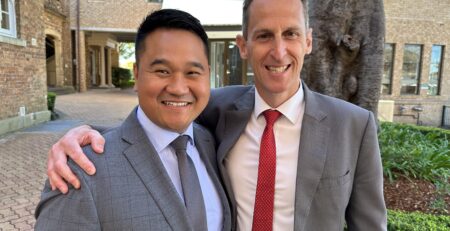From the Head Master
As the Federal election campaign period trundles towards its conclusion, I must admit to a slight sense of relief that school education has not been a prominent issue. While I am (unsurprisingly) convinced that education must be a high priority for our nation’s leaders and our society as a whole, experience suggests that campaigns are not a time for nuanced and thoughtful considerations. This, of course, raises the question as to when such considerations are able to take place.
Much of the political discourse around education revolves around funding. Given that our governments, Federal and State, need to determine how to ‘cut up the pie’ of taxpayer dollars, the discussions must inevitably come down to money. What will be resourced, and what won’t? Why should one programme/institution/sector/group receive funds and another not, or receive a different quantum of funding. These are valid questions to ask and answer, although the discussions often end up febrile, with stereotypes, perceptions and rhetoric flying as various interest groups shout past each other.
I do not intend to engage in a defence or critique of the current school funding model in this article. My only comment is to observe that there is an important nuance to notice when the public discussion of funding ensues. The State governments are primarily responsible for the funding received by public schools. The Federal government is primarily responsible for the funding received by non-government schools (which includes both the independent sector and the Catholic systemic schools).
When accusations are made about how much government funding is received by independent schools (like Trinity), particularly when compared the government’s funding of public schools, the nuance to notice is that the reference is usually to Federal government funding, rather than total government funding.
Contrary to the stereotype, Trinity receives less total government funding per student than any public school in the country. It is emphatically not the case that schools like Trinity get more taxpayer dollars than other schools. This point can be validated through the publicly available information on the My School website. (To pre-empt a related question: Trinity does not receive any government funding for capital works.)
This point is not made with intent of crying poor in any way. I am certainly not arguing that Trinity should receive more from the public purse. Generations of parental commitment to the education of their sons, expressed in the payment of tuition fees, enable the School to offer the well-resourced and high-quality education that we do. It makes sense to me that a community’s capacity to contribute should be taken into account in the allocation of public resources and therefore it is right that less-advantaged communities be supported more substantially from public funds.
Consequent to the fact that we are in receipt of public funds, I think that there is a question that schools like us will need to continue to ask ourselves and that is ‘How do we as a School contribute to the public good?’ We cannot be simply bastions of privilege and the perpetuation of socio-economic advantage. We need to be demonstrably committed to the public good.
There are a number of ways in which this might (and does) take shape. Primarily, although hardest to measure, the formation of young men who will be a positive force for good in our world is a ‘public good’. Another possibility is for us to consider the issue of access to our facilities and resources, although this is complicated by the understandable desire for amenity by those who live nearby. One other very significant possibility has to do with enabling access to a Trinity education for those who cannot otherwise afford it, providing opportunity to less-advantaged boys.
Last week, the Trinity Grammar School Foundation established a Scholarship Trust. This tax-deductible fund is intended to grow an endowment that will be used to ‘widen the gates’ to welcome boys who would not otherwise be able to come to us. The Trinity community will hear more about the Foundation’s Scholarship Trust in coming weeks. For now, let me note that this is one way in which the extended Trinity Grammar School community can demonstrate and grow its tangible commitment to the public good.
I am convinced that our School contributes to the public good. I suspect that most of those in our extended School community would agree. The challenge we face is to do so more and more, and to be able to make this contribution visible to our wider society.
Detur gloria soli deo
Tim Bowden | Head Master
















